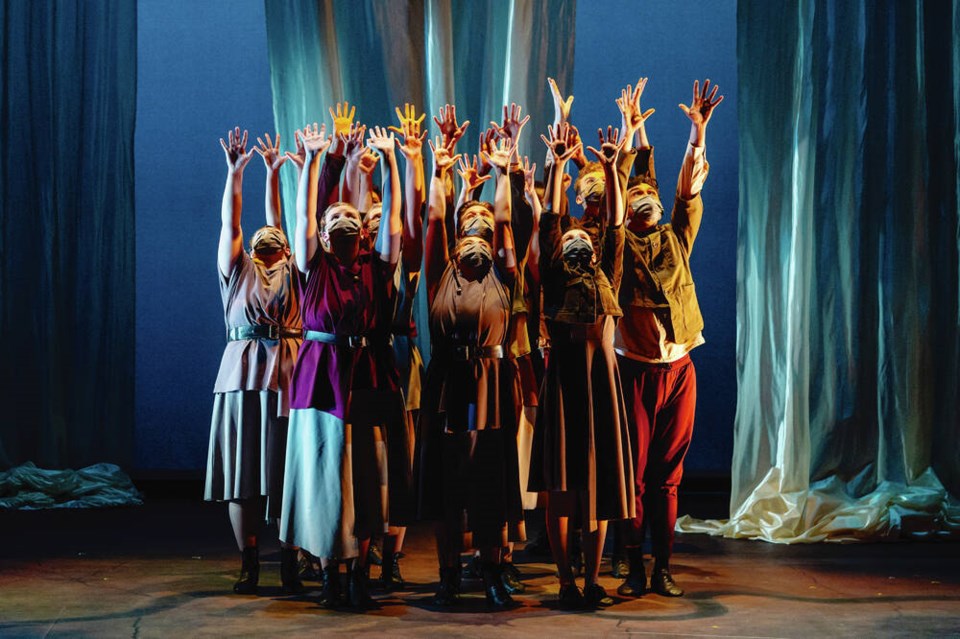Director/choreographer Conrad Alexandrowicz certainly doesn’t lack ambition. On Thursday night the University of Victoria’s theatre department premiered The Waste Land, his theatrical adaptation of T.S. Eliot’s thunderously difficult masterpiece.
Performed by theatre students in COVID masks, the 75-minute work is intriguing - and not for the faint hearted. It arguably works best as a spectacle. With assistance from choreographer Jacques Lemay, Alexandrowicz has created visually powerful scenes that would dovetail snugly into a night of modern dance.
Corpses roll briskly across the stage; a straw-boatered man leads a jaunty Shakespearean Rag dance; beer-guzzling celebrants stagger about singing country and western. There’s dramatic use of three ceiling-to-floor silk drops that shimmer and billow.
Reciting lines while wearing medical masks is difficult. Several lead actors projected well; others were less successful in being heard beyond the spotlights. A greater emphasis on projection and - and a more heightened theatricality in delivery - would have improved this performance.
One of the most celebrated poems of the 20th century, The Waste Land (1922) is also among the most challenging. In 434 lines, Eliot offers a mind-bending kaleidoscope of images and references that has had scholars and students flipping through textbooks for a century. Said to contain more than 100 literary allusions, The Waste Land tips its hat to Dante, Huxley, Petronius, Shakespeare, Milton, Marvell, Ovid, Spenser, Chaucer, Baudelaire, Wagner and Virgil. Eliot also references such things as the Fisher King and the Holy Grail, Christianity, Buddhism and Hinduism.
It’s not all high minded stuff - the poet delves in the foul rag and bone shop when required. A publican bellows “It’s time!” while beer-swilling women trade gossip. The aforementioned Shakespearean Rag was a low-brow ditty of the time - the 1920s equivalent of Barbie Girl or Baby Got Back.
This stage production conveys a strong sense of the themes that obsessed Eliot. He wrote of an England devastated by the First World War and downtrodden by modern life in general. His characters suffer post war post-traumatic stress; they’re disconnected from nature, alienated, spiritually barren.
Death lurks around every corner. One battle-addled veteran asks if a buried corpse has “begun to sprout” in a garden. In Alexandrowicz’s stage version, people appear to nibble at dead bodies like rats.
To hear The Waste Land recited is to be reminded how powerful and compelling it can be. There’s a pure thrill to hearing such lines as “April is the cruellest month, breeding/Lilacs out of the dead land, mixing/ Memory and desire…”
In the stage adaption this is delivered by a man lying on a couch while his psychiatrist takes notes. Alexandrowicz reimagines other passages in bold fashion as well. The section that mentions “There is shadow under this red rock” is delivered by two evangelist preachers with Southern accents. When the “carbuncular” young man forces himself on an unresponsive woman, the stage version has this act simultaneously mirrored by another couple: a woman strangles a man - a visual manifestation of the victim’s rage.
Also audacious - after singing lines from London Bridge is Falling Down - Alexandrowicz has the cast dancing to the rock song London Calling. We definitely know T.S. Eliot wasn’t a Clash fan, yet it seemed thematically appropriate with such lyrics as: “London calling to the faraway towns/ Now war is declared and the battle come down/London calling to the underworld/ Come out of the cupboard you boys and girls.”
If you haven’t read The Waste Land (or if it’s been a while) I’d recommend refreshing yourself before attending the show. It continues at UVic’s Phoenix Theatres to Feb. 26. Online performances are also available.

